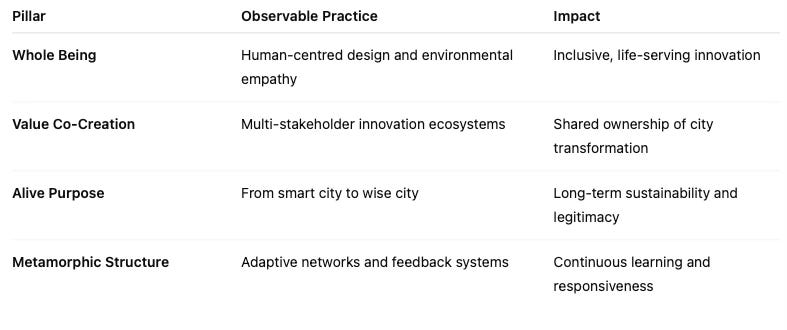Copenhagen Solutions Lab - Case Study
Smart Cities as Living Ecosystems for People, Planet, and Innovation
Context and Overview
Copenhagen Solutions Lab (CSL) is the official smart city innovation hub of the City of Copenhagen, founded in 2014 under the municipality’s Technical and Environmental Administration (TMF). It was created to transform the city into a testbed for sustainable, data-driven solutions, developed collaboratively by public institutions, universities, startups, and global technology partners.
Its mission is rooted in the city’s ambition to become the world’s first carbon-neutral capital by 2025. CSL acts as a cross-sector platform, connecting municipal departments, businesses, researchers, and citizens to co-develop solutions in mobility, energy, waste, digital infrastructure, and citizen wellbeing.
“We use the city as a living laboratory.” — Copenhagen Solutions Lab
1. Whole Being – Integrating Human and Environmental Intelligence
Copenhagen Solutions Lab redefines what public service means by focusing on both human and planetary wellbeing. It integrates the emotional, cognitive, and ecological dimensions of urban life — designing for the whole being of the city.
Key practices supporting Whole Being:
Human-Centred Design: Projects begin by understanding citizen experiences, not just technical needs.
Cross-Disciplinary Teams: Urban planners, social scientists, engineers, and designers co-create together.
Learning-Oriented Culture: Teams experiment, iterate, and learn openly from failures.
Empathy in Policy Design: Civic data and feedback loops reflect real human and environmental impacts.
Through this, CSL cultivates a culture of living intelligence — blending empathy, data, and action.
2. Value Co-Creation – A City-Wide Innovation Ecosystem
CSL operates as a multi-stakeholder co-creation platform, uniting city officials, companies, universities, and citizens.
Examples of co-creation initiatives:
City Data Exchange: A public-private partnership with Hitachi and the Danish Innovation Foundation enabling open data sharing across sectors.
EnergyLab Nordhavn: Collaboration among Ørsted, DTU, and other partners to create a model district for integrated energy systems.
Intelligent Traffic Systems: Co-created mobility projects using sensor data and AI for sustainable transportation.
Open Innovation Challenges: Citizens and startups invited to co-design solutions to climate and mobility challenges.
Value creation emerges through relationships and shared purpose, rather than top-down planning — a hallmark of Value Co-Creation.
3. Alive Purpose – From Smart City to Wise City
Copenhagen Solutions Lab’s Superior Purpose is to move beyond technology toward “a wise city” — where innovation serves life, not just efficiency.
Purpose in practice:
Carbon Neutrality by 2025: Climate action as core strategic north star.
Inclusive Digitalisation: Ensuring digital transformation enhances equality and participation.
Systemic Foresight: Anticipating urban transitions in energy, mobility, and demographics.
Ethical Data Use: Creating transparent frameworks for how citizen data is used and governed.
CSL’s purpose is not merely about smart infrastructure — it is about creating an adaptive, ethical urban organism that learns and evolves with its inhabitants.
4. Metamorphic Structure – City as a Living System
Copenhagen Solutions Lab functions through a metamorphic structure that mirrors biological ecosystems — flexible, networked, and self-regulating.
Structural features:
Distributed Innovation Clusters: Projects initiated by cross-departmental and cross-sectoral teams.
Dynamic Partnerships: Each initiative brings together unique constellations of actors (city, academia, business, citizen).
Open Platforms: Digital tools and open data infrastructures enable continuous adaptation and collaboration.
Feedback Loops: Urban data flows back into policy and design decisions in real time.
This structure turns the city itself into a living, sensing organism — capable of collective intelligence.
Governance and Decision Flow
Governance at CSL embodies adaptive, participatory principles:
Collaborative Governance: Steering groups include representatives from city departments, citizens, and external partners.
Transparent Data Governance: Ethical frameworks ensure accountability and public oversight of data use.
Agile Project Governance: Teams operate in iterative cycles of experimentation, evaluation, and scaling.
Network Stewardship: Leadership facilitates connections and alignment rather than imposing direction.
Governance functions as a living coordination system, balancing innovation freedom with ethical coherence.
Systemic Integration
Copenhagen Solutions Lab demonstrates exceptional integration across all four pillars:
Together, these make Copenhagen a prototype for living urban governance.
Lessons for Other Organisations
Cities can be living systems – Design governance to sense, learn, and evolve continuously.
Use data with empathy – Measure what matters for people and planet, not just efficiency.
Foster cross-sector collaboration – Innovation happens at the intersection of disciplines and domains.
Balance digital with ethical – Make technology a servant of life, not the other way around.
Turn citizens into co-designers – Democracy and innovation thrive together.
CSL shows how purpose, participation, and data intelligence can converge into living public innovation systems.
Conclusion
Copenhagen Solutions Lab embodies the evolution from a smart city to a living city — one that listens, learns, and co-creates with its citizens. It demonstrates how technology, governance, and empathy can merge into a new civic paradigm: cities as living organisms serving human and ecological flourishing.
“A truly smart city is one that learns from the life within it.”
— Copenhagen Solutions Lab Vision
Enjoy reading and applying these materials. If you’d like to receive additional information regarding Alive Organisations topic please subscribe below.


